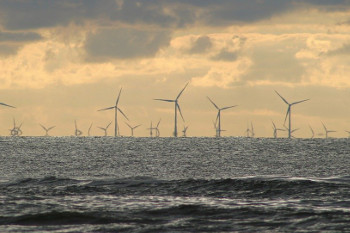This innovative research project is investigating the potential of harnessing offshore wind and marine renewable energy.
Researchers based at the University of Nottingham are investigating harnessing marine renewable energy and offshore wind for conversion to both zero carbon fuels such as hydrogen as part of Ocean-REFuel, a five-year project worth £10m.
The project is being led by the University of Strathclyde, in collaboration with the universities of Nottingham, Cardiff, Newcastle, and Imperial College London.
The University of Nottingham team has received £1.7m from the Engineering and Physical Sciences Research Council, to specifically investigate low pressure solutions to store hydrogen in much smaller volumes safely using solid state storage. They are working on how to maximise hydrogen system efficiency by developing low energy solid state compressors, when you do require high pressures, rather than energy hungry mechanical compressors. The project also includes a techno-economic assessment of proposed solutions, assessment of the circular economy for the new technologies and the integration and potential impact of ocean net-zero fuels on the existing gas infrastructure.

“The Ocean-REFuel project has come at precisely the right time to build on the successes of offshore wind and has the potential to create a step-change in how we consider our whole energy system. The challenges are immense, and we are acutely aware of the importance of getting this right, given the backdrop of the climate emergency and the global consequences unless step changes can be achieved.”
Professor Feargal Brennan, Project Lead, University of Strathclyde
In her role as Minister for Energy, Clean Growth and Climate Change, Anne-Marie Trevelyan commented: “The waters around the UK offer abundant prospects for clean energy. Ensuring that we can tap the full potential of our natural resources will be vital in meeting our bold climate change commitments. As shown through our world-leading offshore wind sector, we are not only capitalising on the clean energy potential around our coastline but also the opportunities for investment, jobs creation and regional growth. Projects like Ocean-REFuel are helping us fulfil that potential as we build back greener.”
Visit the Ocean REFuel website to find out more.